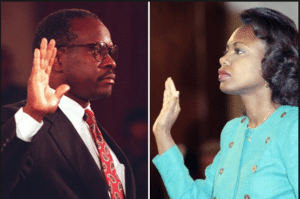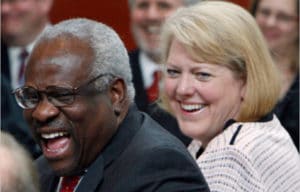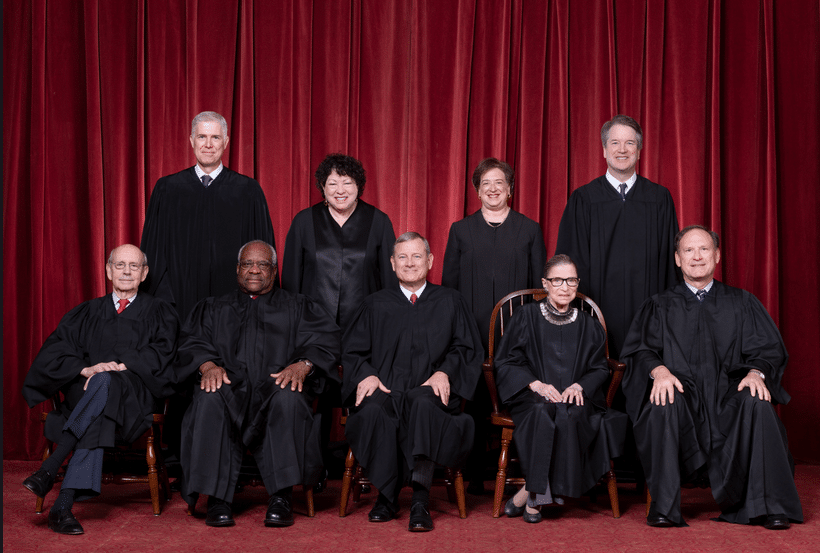 No doubt you recall Professor Christine Blasey Ford’s congressional testimony. She presented a very credible allegation of sexual assault against Supreme Court nominee Brett Kavanaugh. Her testimony should have disqualified him. But the intemperate and incredible way he defended himself proved beyond any reasonable doubt that he was unfit to serve.
No doubt you recall Professor Christine Blasey Ford’s congressional testimony. She presented a very credible allegation of sexual assault against Supreme Court nominee Brett Kavanaugh. Her testimony should have disqualified him. But the intemperate and incredible way he defended himself proved beyond any reasonable doubt that he was unfit to serve.
Despite all that, Kavanaugh won confirmation and, eight months later, is sitting quite comfortably on the Court.
More to the point, I feared he would seize every opportunity to lace his opinions with political spite to make us rue the day we opposed his nomination. To date, though, even his most partisan critics would be hard-pressed to cite evidence of such spite. On the contrary, Kavanaugh has given us cause to commend several of his opinions.
Such was the case when the Court published its ruling in Flowers v. Mississippi on Friday. The facts are not relevant for this commentary. Instead, this quote from a Slate report on June 21 should suffice:
In a decision written by Justice Brett Kavanaugh, the U.S. Supreme Court said [prosecutors cannot peremptorily strike blacks in an obvious attempt to secure an all-white jury], reversing Flowers’ conviction in light of obvious racial bias. To Kavanaugh’s credit, his opinion confronts [the white prosecutor’s] racism head-on and bolsters constitutional safeguards against prosecutorial attempts to purge minorities from juries.
Hear, hear!
This brings me to Justice Clarence Thomas. Because he set the precedent for abiding judicial spite that I feared Kavanaugh would follow.
 No doubt you are familiar with Professor Anita Hill’s congressional testimony. She presented a very credible allegation of sexual harassment against then Supreme Court nominee Clarence Thomas. Her testimony should have disqualified him. But the intemperate and incredible way he defended himself proved beyond any reasonable doubt that he was unfit to serve.
No doubt you are familiar with Professor Anita Hill’s congressional testimony. She presented a very credible allegation of sexual harassment against then Supreme Court nominee Clarence Thomas. Her testimony should have disqualified him. But the intemperate and incredible way he defended himself proved beyond any reasonable doubt that he was unfit to serve.
Despite all that, Thomas won confirmation and, twenty-eight years later, is (still) sitting quite resentfully on the Court.
More to the point, I feared he would seize every opportunity to lace his opinions with political spite to make us rue the day we opposed his nomination. To date, he has repeatedly confirmed my fears.
Here is how I crystallized those fears in “Supreme Court Justice Clarence Thomas Speaks…,” October 1, 2007:
He continually vents hostility towards federal laws and programs (most notably affirmative action policies) that were intended to help minorities. This is why so many people feared he would do his best to undermine them. Never mind the galling fact that, by all objective criteria, Thomas was the most famous beneficiary of these laws and programs. …
Thomas seems pathologically committed to deciding the complex and diverse issues of today based on the Jim-Crow mentality of America’s tortured past. That he will be sitting on the Supreme Court for the rest of his life should fill us all with dread.
As fate would have it, Thomas’s dissenting opinion in the above-referenced Flowers case was as condemnable as Kavanaugh’s was commendable. Again, this quote from a New Yorker report on June 21 should suffice:
A Mississippi prosecutor went on a racist crusade to have a black man executed. Clarence Thomas thinks that was just fine. …
Thomas said that the prosecutor’s behavior was blameless, and he practically sneered at his colleagues, asserting that the majority had decided the Flowers case to ‘boost its self-esteem.’ Thomas also found a way to blame the news media for the result.
This, of course, is the same Thomas who blamed the news media for turning his congressional hearing into a “high-tech lynching.” Evidently, he’s still projecting his own insecurity onto others to boost his own self-esteem.
This is not the forum to present an indictment against Thomas. But this quote from a ThinkProgress report on March 1, 2011, speaks volumes:
Other cherished accomplishments that would likely cease to exist in Clarence Thomas’ America include the Civil Rights Act of 1964.
 Except, to be fair, I should note that Thomas believes the government should have no hand in redressing any racial matter. But, in addition to civil rights for black folks, his Darwinian philosophy of jurisprudence obliges him to deny abortion rights for women (yes, he’s just lying in wait to overturn Roe v. Wade), as well as marital rights for gays and interracial couples (despite availing himself of this right to marry his white wife).
Except, to be fair, I should note that Thomas believes the government should have no hand in redressing any racial matter. But, in addition to civil rights for black folks, his Darwinian philosophy of jurisprudence obliges him to deny abortion rights for women (yes, he’s just lying in wait to overturn Roe v. Wade), as well as marital rights for gays and interracial couples (despite availing himself of this right to marry his white wife).
Perversely, his judicial opinions have been so consistent in this respect that he’s arguably the only member of the Court over the past 30 years whose opinions have betrayed relatively little political bias. All the same, the following provided rare insight into the tortured, self-deluding logic that guides his judicial philosophy.
For here is how Thomas attempted in February 2014 to disabuse students at Palm Beach Atlantic University of what he deemed too much race consciousness:
My sadness is that we are probably today more race and difference-conscious than I was in the 1960s when I went to school. To my knowledge, I was the first black kid in Savannah, Georgia, to go to a white school. Rarely did the issue of race come up.
(Yahoo! News, February 11, 2014)
This smacks of willful ignorance, so much so that it’s sad. Clearly, the racial phenomenon of tokenism is completely lost on him.
Which brings me back to the prevailing point: Think what you will of Kavanaugh, he has already earned more redemption in eight months than Thomas has in twenty-eight years – or ever will.
Related commentaries:
Justice Thomas…
Ford-Kavanaugh vs Hill-Thomas…

Legacy Note: With over 5,600 posts spanning 20 years, I am easily the most prolific blogger on the most eclectic array of topics on the web. That makes The iPINIONS Journal an unparalleled archive of informed political and cultural commentary. Visit the ARCHIVES section in the sidebar or search by topic. You won’t find a more consistent, independent voice on world affairs.

